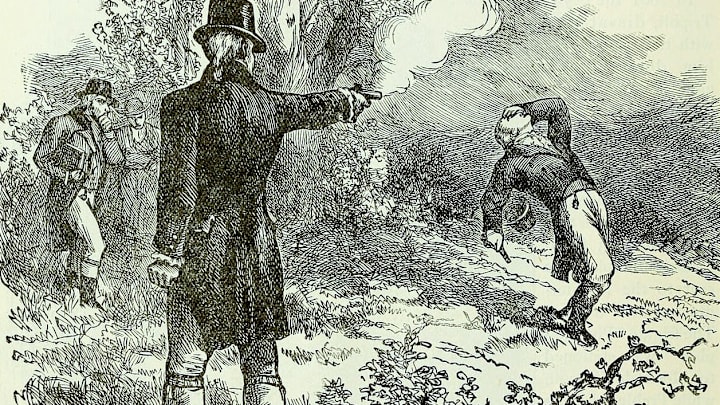After he shot Alexander Hamilton, Aaron Burr's first order of business was to go home and have some breakfast.
Tensions between Hamilton and Burr had been simmering for years. Having victoriously emerged from his encounter with Hamilton on July 11, 1804, Burr returned to his estate in lower Manhattan for a hearty meal. Some accounts claim the then-vice president was also pleasantly surprised by a visiting acquaintance (either Burr’s cousin or his broker) with whom he dined, politely choosing not to mention the bloody spectacle that had just transpired.
Hamilton died the next day. For Burr, his opponent’s death marked the beginning of the end.
The Aftermath of the Duel
On August 2, a New York coroner’s jury found Burr guilty on two counts: the misdemeanor of dueling and the felony of murder. Because the duel had taken place in New Jersey, that state issued its own ruling, which also pronounced him a murderer.

“There is a contention of a singular nature between the two States of New York and New Jersey,” Burr noted in a letter to his daughter Theodosia. “The subject in dispute is which shall have the honor of hanging the vice president.”
Facing a tempest of public outrage, Burr eventually set sail for Georgia, where plantation owner and former Senator Pierce Butler offered him sanctuary.
Vice presidential duty soon called. Because he was president of the Senate, Burr returned to Washington, D.C., that November to oversee the impeachment of anti-Jeffersonian Supreme Court Justice Samuel Chase. Not long after, with some help from a contingent of Republican senators, Burr’s case was dropped in New Jersey. By then, he’d already stepped down from the vice presidency.
Acquitted of Treason
Burr’s saga was far from over, though. After leaving D.C., he began aggressively recruiting allies as part of his plan to seize America’s western territories. Among the men he managed to enlist was General James Wilkinson, who became the Louisiana Territory’s first governor—and maintained a treasonous relationship with Spain. Burr began training his own army before he was arrested in present-day Alabama and put on trial for treason. He was acquitted. His scheme foiled and his image scarred, Burr went to Europe and did not return to the United States until 1812.
By then, the nation was at war with Great Britain and had largely forgotten his attempted conspiracy. Toward the end of his life, Burr went back to New York, where, despite the 1804 ruling, he was never actually tried for murder. He revived his law practice and married his second wife, the notorious socialite Eliza Jumel. It wasn’t a particularly happy union. Jumel hired Alexander Hamilton Jr., Hamilton’s second-oldest son, to sue Burr for divorce. A judge finalized their divorce on September 14, 1836. Burr died that same day at the age of 80.
Read More Stories About American History:
A version of this story was published in 2020; it has been updated for 2024.
